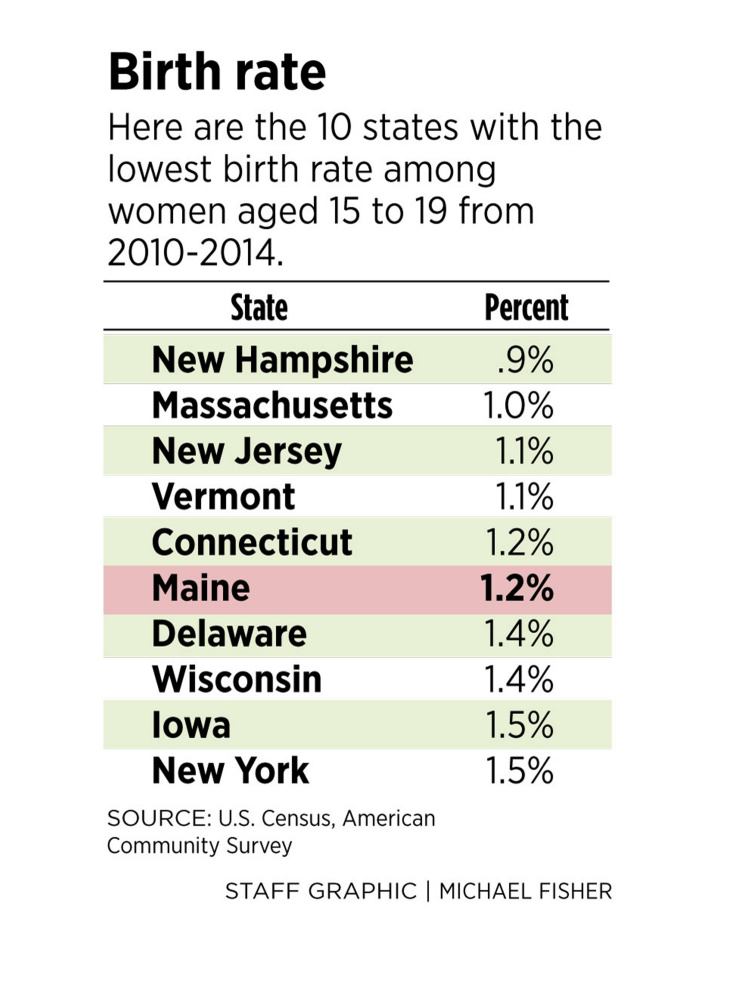Far fewer teenagers are giving birth in Maine than 10 years ago, according to new U.S. Census survey data.
While the birth rate in Maine continues to decline among all age groups, the data show more of the women having children are unmarried, and now account for more than one-third of all births.
Nationally, the teen birth rate has been plummeting for decades, but in Maine teen births have dropped more precipitously. Maine’s teen birth rate is about half the national average and sixth-lowest in the country. New Hampshire has the lowest teen birth rate at 0.9 per 100 women.
Maine’s rate of 1.2 births per 100 women for ages 15-19 is nearly half of what it was a decade ago, when there were 2.1 births per 100 women in that age group. The current birth rate translates into about 500 births by teen moms in the state per year.
For women ages 15 to 50, the birth rate declined from 4.9 births per 100 women to 4.7 births per 100 women.
Jennifer Thibodeau, a spokeswoman for Maine Family Planning, an Augusta-based nonprofit advocacy and public education group, said educational efforts in schools have been effective in promoting evidence-based sex education classes in Maine. The curriculum goes beyond informing teens about sexually transmitted diseases and pregnancy by also teaching teens about how to communicate with each other about consent, birth control and whether to have sex.
“Learning about viruses and bacteria is important, but if you can’t communicate with your partner, it’s not going to matter,” Thibodeau said.
She said improved access to birth control and more effective birth control methods that have been introduced in recent years also are helping to cut rates.
Lynette Johnson, director of prevention programs for Maine Family Planning, said the group works with about 40 schools per year to get the message out about what’s the most effective curriculum to reduce teen pregnancy and delay the onset of sex.
“We focus on what works,” Johnson said.
On Thursday, the Census released its American Community Survey, which is completed annually in addition to the official Census that is conducted every 10 years.
For the first time, the survey compared averages from two five-year periods, 2005-09 and 2010-14, giving demographic experts a detailed look at how America has changed over the 10-year span.
While the teen birth rate continued its long decline, the survey found that unmarried Maine women accounted for 37.2 percent of all births, up from 30.8 percent.
That doesn’t necessarily mean there are more single moms, although the data doesn’t present a clear picture.
According to the Census, households headed by single women with children stayed almost identical, and is statistically within the margin of error, going from 9.6 percent of all households in 2005-09 to 9.7 percent in 2010-14. Similarly, the percentage of households headed by single fathers was statistically the same between the two time periods, at about 4 percent.
Divorce increased from 12.6 percent of all Maine adults to 14 percent, while those who never married jumped from 26.9 percent to 27.6 percent. Adults co-habitating increased from 8 percent to 9 percent. Married couples declined from 52.6 percent to 51 percent.
While there’s conflicting data, Virginia Rutter, a professor of sociology at Framingham State University in Massachusetts who has studied co-habitation and other modern family trends, said overall there is movement toward more non-traditional families.
“We have a lot of different ways now that people arrange their families,” said Rutter, who is also a senior scholar with the Council on Contemporary Families. For instance, it’s not unusual now to have long-term co-habitating couples with children. Maybe they never marry, or maybe they marry after the children are a little older, she said.
Research is showing that co-habitating couples who later marry are less likely to divorce if they began living together when they were older. The determining factor is how old – and likely more mature and stable – couples are when they begin co-habitating.
Send questions/comments to the editors.




Success. Please wait for the page to reload. If the page does not reload within 5 seconds, please refresh the page.
Enter your email and password to access comments.
Hi, to comment on stories you must . This profile is in addition to your subscription and website login.
Already have a commenting profile? .
Invalid username/password.
Please check your email to confirm and complete your registration.
Only subscribers are eligible to post comments. Please subscribe or login first for digital access. Here’s why.
Use the form below to reset your password. When you've submitted your account email, we will send an email with a reset code.